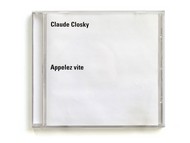
Appelez vite, 1995
1 audio CD stereo sound (Fr.), 2 loudspeakers, 4'
In the wake of Restez à l'écoute, Appelez vite is a sound sequence of numbers intoned one behind the other by different radio voices. This work is a collage in which all that Closky has retained of the classic advertisement is a series of telephone numbers which the listener is invited to call, in a more or less peremptory way. The piece works in a continuous loop: quite literally with neither beginning nor end, it overlaps with the undifferentiated penetrating power of radio broadcasting. As in Restez à l'écoute, the tone in which the telephone numbers are chanted combines seduction and subtle instruction. The work is indeed hedging its bets: memory, and all it can contain for the viewer/listener by way of things humdrum, household and above all familiar; and the feeling of absurdity, improbability and even anxiety that it cannot fail to arouse. Closky's sphere of action is obvious enough: his quest is part and parcel of a decontextualization of the familiar stereotypes of the imaginative world of communications which it brings to the fore. But this quest is not just an acknowledgement. It makes the most of the cracks in the unconscious zone of perception, which it calls upon but nevertheless does not “rectify” in any way whatsoever. Closky is, de facto, not following in the footsteps of the Pop artists, for example, and of Warhol in particular. The artist acts on the sound material in the selection and editing phase by making a form which pursues a twofold and simultaneous aim: to inhabit the void and mark a space, even if it is a purely mental one. In Appelez vite, the method of potential contact is evident (the succession of telephone numbers) but, by design, it lacks all identifying details. So the listener remains in the total darkness of his strange impression of humdrum everydayness betrayed. On the other hand, the alienating component emerges without any ambiguity, and this perplexing dimension, which invites the public to proceed from the work to its original context, has no option but to oblige people to question both the power of alienation that is latent in the media, and its unpredictable and insidious effectiveness.
Andrea Lissoni
Translated by Simon Pleasance